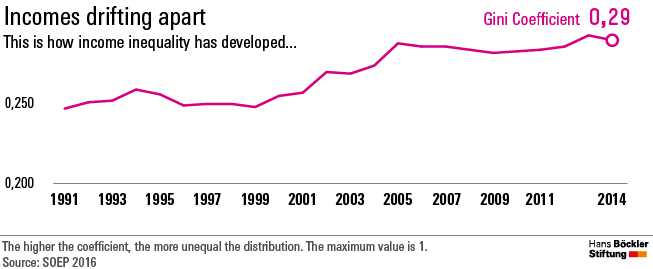: 1. Is inequality of income growing?
Differences in income are now much greater than twenty years ago. This is evident from the Gini coefficient, a statistical measure of inequality. It was primarily at the beginning of the 2000s that inequality in the household incomes in Germany recorded in the Socioeconomic Panel (SOEP) increased. In subsequent years the Gini coefficient decreased slightly, but inequality has risen again since 2010. According to the latest available data, in 2013 and 2014 it was even slightly above the 2005 level.
Making allowance for inflation, the disposable incomes of the lower 40 per cent of the distribution have fallen since the beginning of the 2000s. On the other hand, the growths in income of the upper ten per cent have been well above average (Grabka and Goebel 2017). One reason for this development is the increasing importance of capital incomes: in the 1990s, capital incomes and wages initially rose in tandem; between 2003 and 2007 the former rocketed. For a long period wages hardly went up at all (Spannagel 2015).
Compared to other countries, what is noticeable is that in this country the percentage of low-wage earners is particularly high. In 2014, 22.5 per cent of employees in Germany were affected. Only in Latvia, Romania, Lithuania, Poland and Estonia was the percentage of low-wage earners higher. According to Eurostat (2016) the average in the EU is 17.2 per cent. Low-wage earners are employees whose gross hourly pay amounts to two thirds or less than the median hourly rate.
References
Grabka, Markus M., Goebel, Jan: Realeinkommen sind von 1991 bis 2014 im Durchschnitt gestiegen – erste Anzeichen für wieder zunehmende Einkommensungleichheit (pdf), DIW-Wochenbericht 4/2017
Spannagel, Dorothee: Trotz Aufschwung: Einkommensungleichheit geht nicht zurück, WSI-Verteilungsbericht 2015
Eurostat: Verdienststrukturerhebung: Jeder sechste Arbeitnehmer in der Europäischen Union ist Niedriglohnempfänger, Dezember 2016
